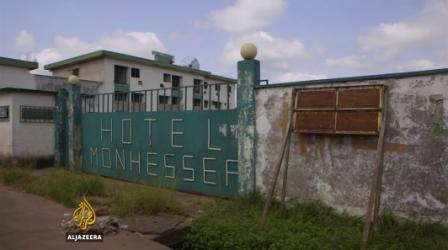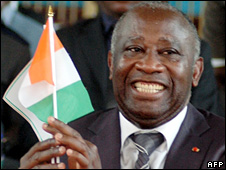Rebuilding Cote d’Ivoire: Lessons from Sierra Leone
To tackle Cote d’Ivoire’s intractable problems after the demise of Gbagbo’s regime, security sector reform, reconciliation, resettlement and development must work in tandem
The demise of Laurent Gbagbo’s regime offers fresh opportunities to tackle Cote d’Ivoire’s intractable problems. Hundreds of people have lost their lives, about a million have been displaced from their homes, infrastructure and properties have been destroyed, and economic life remains precarious. Gbagbo’s continued hold on power would have emboldened leaders who lose elections to stay in office, dealing a blow to the region’s fragile democracies.
However, Gbagbo’s exit does not solve the problems of Cote d’Ivoire, which remains a divided country. Although Alassane Ouattara won the elections, almost half of the population voted for his opponent. The country’s 20 million people of 70 ethnicities form five regional clusters: the Akan in the eastern and central parts of the country; the Krou and allied groups in the southwest; the Southern Mandé in the west; and the Voltaic and Northern Mandé in the north. The southern groups tend to be Christian, and those in the north Muslim. The influx of migrants from predominantly Muslim Burkina Faso, Mali and Guinea in search of work during the boom of the 1960s and 1970s changed the ethnic distribution in favour of Muslims.
As demands for competitive elections grew and the political elite that succeeded the founding president, Houphouet Boigny, sought to consolidate its rule, a xenophobic discourse of Ivoirité or indigeneity emerged that elevated the Muslim-Christian/North-South divide over other cleavages. Bold and creative efforts are required to drain the poison of Ivoirité from the body politic, manage the North-South schism, and develop a culture of shared citizenship.
Sierra Leone’s post-conflict experience offers lessons on national security, inclusive government and development.
Sierra Leone’s conflict was of course more destructive and less ethnic than Cote d’Ivoire’s. Still, Cote d’Ivoire will have to rebuild its divided army, disarm militias, and provide security to its traumatised citizens. In highly polarised settings, security sector reform should not be left to winners alone. In Sierra Leone, the government worked with the United Nations peacekeeping mission (UNAMSIL) and Britain in providing security for a number of years before full responsibility was transferred to national authorities. Fortunately, soldiers in UN peacekeeping missions in Africa today are largely drawn from the continent and other developing countries, avoiding the stigma of neocolonialism. In Sierra Leone, the bulk of the force was Nigerian. Britain’s military back-up to UNAMSIL mainly served as deterrence.
The UN may have to expand its mission in Cote d’Ivoire. Can France play a similar role in Cote d’Ivoire as Britain did in Sierra Leone? The French have been more forceful in carrying out regime change in Cote d’Ivoire than the British were in Sierra Leone. Surely, without French power, the stalemate would have continued and more lives would have been lost.
However, there are constraints on the use of the French military as deterrence because of distrust of French motives among sections of the Ivorian elite. Differences between British and French engagement with their ex-colonies may account for this. The British establishment has fewer social ties with African elites, whereas France has nurtured strong bonds with elites in its ex-colonies. Jean-Christophe Mitterrand, son of former French president François Mitterrand, and Martin Bouygues, head of the French industrial group, Bouygues, attended Ouatarra’s wedding in 1991. France retained military bases in most of Francophone West Africa and has often been accused of defending friendly authoritarian leaders. Today, partly because of weak post-colonial ties, most Sierra Leoneans consider Britain’s military presence in Sierra Leone as benign. The same cannot be said about elite attitudes towards France in Cote d’Ivoire.
The winner, Ouattara, also needs to form a government that is perceived as inclusive by those who did not vote for him. Again Sierra Leone provides useful lessons. The immediate post-war leader, Ahmed Tejan Kabbah, reached out to sections of the country (the North and West) that disliked his party. He even incurred the wrath of party stalwarts in the South for insisting on a balanced cabinet. In the 2002 elections held just after the war, he recorded 70% of the vote as president, and his party won 18 of the 40 parliamentary seats in the North. Today there are a large number of Northern elites in his party; and at least 8 of the 19 candidates for the party’s 2012 presidential ticket claim to have Northern roots. The current Northern-dominated government has recently borrowed a leaf from that experience of inclusive government after some faltering steps that alienated Southern elites.
Finally, governments should avoid an incremental approach to reconstruction that privileges reconciliation and humanitarian assistance over development. This is because by the time the development phase is reached; confidence in peace improving the well-being of most people may have waned, forcing voters to turn against incumbents. If Kabbah’s government did well on reconciliation, it scored poorly on development, preferring to focus on small projects, such as rehabilitating schools, clinics, traditional courts, markets, and police stations that are essential in resettling populations but inadequate in moving economies forward. Issues of infrastructure development, energy provision, agricultural transformation and employment are only now being seriously addressed. Voters rejected the party in the 2007 elections.
The lessons for Cote d’Ivoire are clear: security sector reform, reconciliation, resettlement and development must work in tandem; and governments must ensure that the people, especially the youth, see improvements in their lives.
By Yusuf Bangura
About the author: Yusuf Bangura is Research Coordinator at the UN Research Institute for Social Development in Geneva, and the lead author of ‘Combating Poverty and Inequality: Structural Change, Social Policy and Politics.
Stay with Sierra Express Media, for your trusted place in news!
© 2011, https:. All rights reserved.






kojo
/
ivorians should stop fighting and focus on the country future
19th May 2011